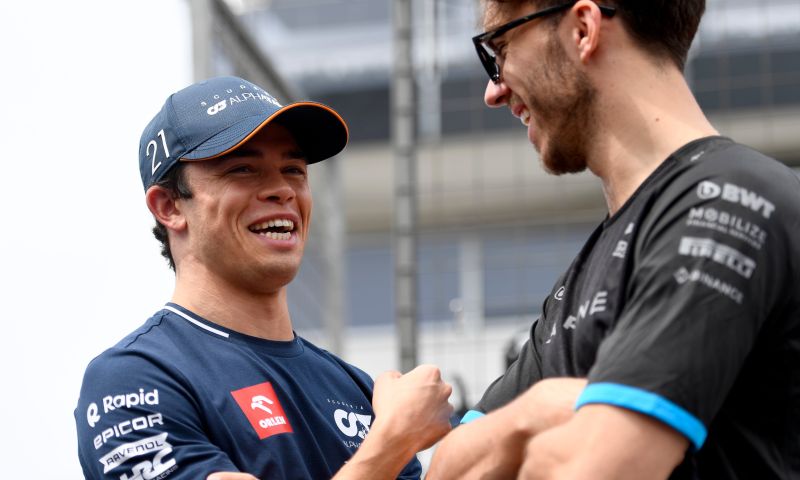De Vries enjoys 'well-known F1 community': ''Everything is about performance''
Red Bull Contentpool
Exclusive

Nyck de Vries has finally made his dream come true in 2023. He will be part of the Formula 1 grid as AlphaTauri's driver. Ahead of the Azerbaijan Grand Prix weekend, GPblog spoke at length with the Dutchman about his first races in the top class of motorsport.
More attention in F1
It is windy at the Baku City Circuit when De Vries joins the AlphaTauri hospitality table after lunch. He asks his press officer, who is also debuting in F1 this year, if he can fetch a jacket, as it is particularly chilly. So we move from the shade to the sun to discuss his first months in F1 without goosebumps on his arms.
"It feels like an environment I already know very well because I've been walking around here for years. Only now I'm in the car myself. In terms of work, it is very similar to what I have done in previous years in Formula E with Mercedes and endurance racing. All car manufacturers and constructors have similarities when running a team. Those were all professional teams, so in that respect, I had a pretty good base."
While it is true that, as a 28-year-old driver, De Vries already has a mountain of experience as a Formula E world champion and Formula 2 champion, F1 is a lot bigger in everything. "Especially the size of the platform and the focus on the sport. During a race weekend, you notice that there are a lot of fans, like in Melbourne. There you really meet the fans on that Walk of Melbourne. But ultimately, once the weekend starts, then the work is the same as always. At the end of the day, then performance is key, that's what it's all about, and that's no different from other classes."
Dare to dream is the name of De Vries's documentary that came out on Viaplay, but after three races, is it still a dream to drive in F1 as well, or does it then also become just work? "From the moment you realise you are going to realise that dream, very quickly comes the realisation that you are now part of this community. And that ultimately, the same principles and the same essences are central again."
De Vries knows he has to perform
"Everything is ultimately about performance. It's a sport, and everyone works very hard to score as many points as possible. Of course, the size is bigger, the platform is bigger, and there is more attention to this sport worldwide, but you live your whole life towards the moment you get that chance. Then, when you get that chance and are part of it, it ultimately comes back down to performance."
De Vries' performance showed a visible upward trend. In Bahrain, he was still behind Yuki Tsunoda, but the Dutchman was already getting a lot closer in Saudi Arabia and Australia. In Baku, De Vries had hopes of getting a jump on that duel but unfortunately experienced a weaker weekend with a crash in qualifying and the race.
Franz Tost protects his pupil. According to the AlphaTauri team boss, rookies, including those with De Vries' CV, need three years to prove themselves in F1. After that, they need to make mistakes to know where the limits are.
Jan Lammers also spoke up for his compatriot. According to the former F1 driver, it is a good thing that Tsunoda is faster than De Vries initially. That way, De Vries has a good benchmark to work towards. De Vries understands Lammers' thinking but knows better than anyone that performance comes first.
Narrowing the gap with Tsunoda
"By definition, that is, of course, your first competitor, and of course, you try to beat them, but internally I think the last two weekends, especially the qualifying sessions, were very competitive. Everyone looks at that in their own way, but internally, when I look at the last two weekends, I think it was a step forward compared to the first weekend. And I'm trying to build on that."
After three races, as a rookie, you are also not yet entirely at one with your car, but it could also be that your teammate impresses. According to De Vries, it is a combination of things that prevent him from getting the most out of his race weekends at the moment.
"It's more a combination of. That with your team, with the people working with you, you learn together what you expect and need from each other to get the maximum out of the package. In the beginning, you still have to match the size of a problem. If I were to say something, is it a big problem or a small problem? We have to go through and experience that learning process together to learn from that later and become as precise as possible in that.''
After a long break, De Vries is happy to have the chance to race again in Miami after his inferior weekend in Azerbaijan. Whereas he was fed up with the long break, he can now get into a rhythm. Making mistakes is good to learn your limits. Now it will be interesting to see how fast De Vries is when he learns from those mistakes and knows exactly how to find the limits.

